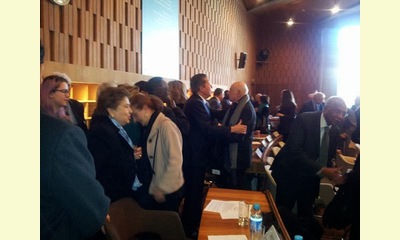|
|
Federico Mayor once again at UNESCO
un articulo por Manuel Dios Diz, President, Seminario Galego de Educación para a Paz (abridged)
. . . [At the celebration of his 80th birthday],
Federico Mayor Zaragoza, former Director General
of UNESCO from 1987 to 1999 , moved like a fish in
water . Back to where he had managed to pass
resolutions and declarations of great
significance, particularly, the Culture of Peace
and its Plan of Action, then taken over by the UN
General Assembly in 1999. He was accompanied by
Georges Kutukdjian, who organized the tribute for
his 80th anniversary, along with other
personalities from a broad and plural Committee
involving Françoise Riviere, Breda Pavlic, Doudou
Diene and Pio Rodriguez, a member of the Executive
Board and the only representative of Spain who
spoke at the tribute. The Spanish Ambassador to
UNESCO, D. Juan Manuel Barandica Luxán did not
speak.

Federico Mayor with Edgar Morin (center)
click on photo to enlarge
Everyone presented awards accolades, sketches and
emotional memories of the extraordinary
distinguished thinking and actions carried out at
UNESCO when he was the Director General for 12
years. The footprint left at that institution by
Professor Mayor Zaragoza, from the humblest
officer to executive directors, has been enormous.
All the interventions reflected love and longing,
from the current director, Irina Bokova, his
predecessor, Amadou Mahtar M'Bow, his successor,
Koichiro Matsuura, to the current President of the
Executive Board, Mohamed Sameh Amr .
If I had to highlight some of the speeches that
impressed me the most, I certainly should cite
Mihail Gorbachev, Mary Robinson, Kofi Annan and
Mario Soares .
Especially emotional words were delivered by
Boutros Boutros Ghali, former Secretary General of
the United Nations, Robert Badinter, former French
Justice Minister under Mitterrand, Henri Lopes,
Aminata Tahoré and Edgar Morin. All of them
highlighted his role and his ability to make the
impossible possible, his commitment to Africa and
to education for all. There was even time for a
group of officials and UNESCO officials to sing
happy birthday.
Federico Mayor Zaragoza, replied and thanked
everyone; those he did not thank by name were
quoted in writing and entered on the record of the
celebration. He spoke of his passage through the
international institution that represents the
intellectual role of the United Nations. UNESCO,
he said, must regain its leadership to build peace
in the minds of men, with independence and rigor,
with civic courage. We must live up to the
challenge put forth in the UNESCO Charter and in
the Universal Declaration of Human Rights. We,
the people, must save our children from the horror
of war, all equal in dignity, oriented to civic
and democratic values, to justice, solidarity ,
equality, fraternity, rising above market values,
promoting the culture of peace, education for
peace, human rights and democracy, urgently
needing a Universal Declaration on Democracy,
rededicating ourselves to intercultural dialogue
and the alliance of civilizations, to overcoming
poverty and exclusion, to peacebuilding, to the
peaceful resolution of conflict . .
(Click here for a Spanish version of this article)
|








|
DISCUSSION
Pregunta(s) relacionada(s) al artículo :
Where in the world can we find good leadership today?,
* * * * *
Comentario más reciente:
:
Once again, as they have done now each year since 2009, the Nobel Women's Initiative provides biographies of 16 women leaders involved in local action for peace and justice around the world, and in particular to stop violence against women. Last year's biographies were listed in the CPNN discussionboard.

|
|









